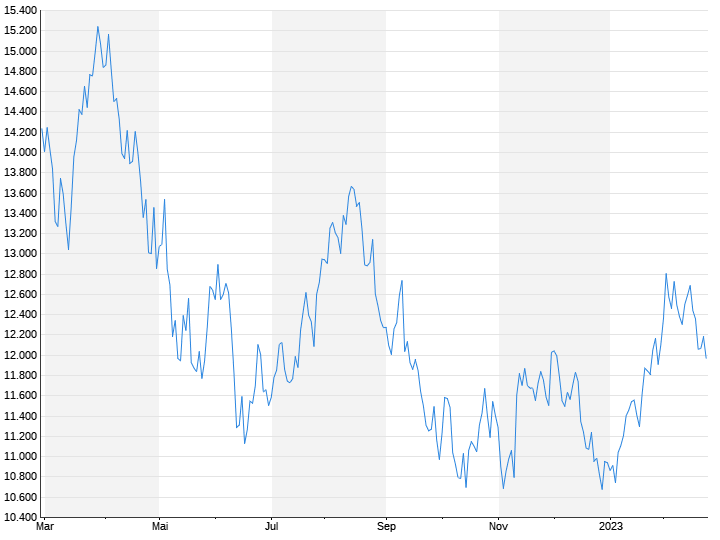Stefan Waldmeister invests in young tech companies – similar to Frank Thelen or Cathie Wood. In an interview, the business mathematician and ex-entrepreneur explains how his approach differs, why he believes Thelen has a “huge problem” and Cathy Woods has an advantage.
Tech stocks have risen almost across the board since the beginning of the year. Even a group like Alphabet, which has recently produced rather bad news, has increased by eight percent. Why is that?
Stefan Waldhauser founded the software company WeWebU in 2000 and sold it to the American company Alfresco in 2013. There he worked regularly in Silicon Valley for five years before leaving in 2018 and becoming a full-time investor. Waldhauser primarily invests in second- and third-tier tech companies.
Stefan Waldmeister: We have to see where the courses come from. Some of the values have fallen by 80 percent in the past year – sometimes rightly so, but sometimes not. The sell-off towards the end of the year in particular was panicky and generated numerous downward exaggerations. The fact that a recovery had to set in is actually only logical.
Are we seeing fair valuations now, or is the market still exaggerating one way or the other?
The tech market always seems to be a market of extremes. At first it only went up for many years, so that as a numbers-driven investor I could hardly find values in which I could invest with a clear conscience. And then last year there was the other extreme. At the moment, I actually think that many companies are rated very fairly, especially in the second and third rows. Actually, the upward trend should not continue so easily. But who knows that. Sometimes I find the large values too expensive again. Tesla, for example, gained over 100 percent. That doesn’t make any sense to me. That’s why I wouldn’t invest in a broad tech fund at this point in time.
Fund managers like Frank Thelen and Cathy Wood currently see things very differently. Thelen has launched two new funds, Wood holds her Ark Innovation ETF for the new Nasdaq. At first glance, they do something similar and invest primarily in tech companies – you can also invest in their portfolio. What do you do differently and why are you more skeptical?
I pay much more attention to numbers and less to narratives. It is now mainstream that tech companies pay attention to key figures such as the “Rule of 40”. But when I read what Frank Thelen and Cathy Wood say, it’s always all about innovation and storytelling: Where are the biggest changes in the future? It’s less about the hard business numbers. I call my approach “Value Investing 2.0”. I create tech indicators and make forecasts for a manageable time frame of three to five years. Anything beyond that I think is dishonest.
Thelen and Wood always argue with their team’s own scientists, because of which they can better assess the developments. What do you think of this argument?
Of course, you can get advice from scientists about technologies. But which players, who are at a very early stage today, will one day dominate the market, no one can reliably predict. Personally, I usually only invest when there is a winner. Of course, for everything else you also need investors, but for me that is more risk capital and not for private investors. Much of what is normally still venture capital has unfortunately been washed up on the stock exchange in recent years – largely driven by Spacs.
Is it even fair to criticize celebrity funds for their miserable performance over the past year? Frank Thelen’s 10xDNA fund lost 51 percent in 2022, Jan Becker’s BIT Global Internet Leaders 53 percent and Cathy Wood’s Ark-ETF even 64 percent. But the Nasdaq Cloud Index has also fallen by more than 50 percent.
With a thoroughbred tech fund, you could only lose in this tech crash. I also had a loss of almost 50 percent in the meantime. And I’ve always warned about how massively overvalued some tech stocks are. But if I manage a pure tech fund with a long-only investment strategy, then as a fund manager I can’t just exit. You get paid by your investors for continuing to invest a large part in such stocks. It’s a little different with Jan Beckers, who also speculates on falling prices from time to time. But Thelen and Wood really had no choice but to invest. You can still criticize them.
In what way?
For example, I find it fundamentally wrong that Thelen is now setting up a series of new funds. With Wood it’s different. Your fund has been around since 2014 and has grown by 100 percent during that time. Even if you gained over 200 percent on the Nasdaq, you could still make money on Cathy Wood. Despite the 2022 crash, I myself am at an average of 13 percent profit per year. Frank Thelen still owes this proof. He should first prove that he can make money for his investors before launching new funds. As of today, it is still 44 percent below its issue price.
Is he possibly also trying to save his image with the new funds? After all, now that prices are lower, the chances of price gains are higher.
It’s the old game: you set up five funds and in the end only talk about the fund that performed best. It’s all legal, but I find it morally questionable.
According to Thelen, there is little research on small and mid caps in the technology sector, which is why many companies are undervalued. He cites this as the reason why he now also has this fund class on offer. There’s a point there, isn’t there?

Yes, the market inefficiencies are more pronounced here. He is right. But it depends on what he means by small caps – how narrow they are in the market. Thelen has a huge problem: the moment he starts communicating about these stocks, he makes the courses himself. That’s also the reason why even I, with my mini-reach, don’t talk about all the stocks in my private portfolio. Otherwise, even I could influence the prices of such narrow-market stocks. A Frank Thelen could of course do that even more. He could almost create his upward movement himself. In the long term, however, this will not go well.
That’s why the names are not published on the 10xDNA website until after the purchase. Is not that enough?
I actually think that’s the worst. If it said: “Unfortunately, we can’t communicate about this company due to the narrow market” – then everything would be fine. But if it is said that the names will be published after the purchase, then he could benefit from it. I don’t want to imply that, but it has an aftertaste.
You invest primarily in second- and third-tier tech stocks, such as Pure Storage, Arista Networks, and Interactive Corp. Why are these companies better than big players like Tesla or Palantir, two key positions in the 10xDNA fund?
I believe that market inefficiencies are smaller for big tech companies. And I’m more confident in understanding and evaluating small companies much better than values from the front row. Sometimes they are incredibly complex. It’s a lot about storytelling, for example when Microsoft puts 10 billion dollars into ChatGPT – regardless of whether there is a business model there or not. Such investments massively change the mood towards Microsoft shares, although I can’t see fundamentally what that means for Microsoft. With the values from the second and third row, I trust myself to do that much more because they are not nearly as complex. Although one also has to say: The stocks in which I invest are all billion dollar companies. It’s not about the small German medium-sized company, but above all about companies from Silicon Valley.
They are well connected there, since they sold their company WeWebU to Alfrescoins Silicon Valley in 2013…
Yes, of course that helps me with the selection. But I don’t necessarily have a preference for Silicon Valley or any other region – I generally invest a lot in America. Anyone who makes it onto the stock exchange in the USA has a completely different quality than European companies – if you disregard spacs, i.e. IPOs via shell companies.
Is Germany really that far behind when it comes to technology?
This is not a German phenomenon, I would relate it to the whole of Europe. The best European software companies no longer go public in Frankfurt or London, but look for their money in the USA and later go to Wall Street there – such as Elastic from the Netherlands.
Your investments are not insider tips. Whoever is valued at over a billion dollars is watched by many. How do you find companies that are still undervalued?
I take a classic look at the numbers and benefit from my past in the software industry. I am a business mathematician by profession and see myself as a value investor. So I’m not really trading differently than Peter Lynch or Warren Buffett – just that tech companies need to be valued differently.
What do you mean?
For example, I can’t calculate a price-to-earnings ratio if there’s no profit. That’s the case with many of these tech companies. You may have positive cash flow but negative net income. So I have to look at other numbers – like gross margin, the rule of 40, and valuation. However, as I said, I can’t make the assessment using the price-earnings ratio, but rather using multiples on the free cash flow, for example.
Let’s take a closer look at the tech sector. Which company do you currently find particularly exciting for an investment?
There are some companies that are obviously trading below their fair value. For me, for example, Interactive Corp is one of them, which is the largest position for me. IAC is a holding in which I can evaluate the individual holdings. There are just two listed holdings in MGM and Angi Homeservices that are already valued higher on the stock exchange than the entire IAC. There are also numerous other investments that you get as a gift. Actually, that should correct itself in the coming years.
And what do you think of investments in artificial intelligence?
Well, ChatGPT naturally created a hype. It is completely unclear which business models will result from this. The fact is: these models have taken an enormous step forward. I’m also impressed by ChatGPT, but I think it’s completely premature to read the Google killer from it – ChatGPT still tells me too many untruths for that. From my point of view, the product is not ready for the market – and far from it. I’m curious to see when the general public will notice. As an investor, I am extremely cautious when it comes to artificial intelligence. There are companies like C3.ai that have almost doubled recently. It’s clearly hype — and it usually backfires for investors.
Is AI even a business model when a query with the Google AI “Bard” costs almost five times as much as a normal search query via Google?
Yes, this is actually a problem that many forget – and also one of the reasons why Google has not yet brought it to market. As an investor, I therefore have to ask myself who the shovel manufacturers are in this “gold rush” – i.e. who is providing the infrastructure for AI when we will soon need triple the bandwidth. Arista Networks is very well positioned for me, for example. But there are a few more that I think are worth checking out.
Jannik Tillar spoke to Stefan Waldmeister
The interview first appeared on Capital.de

